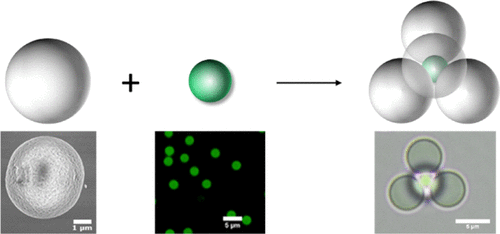Our official English website, www.x-mol.net, welcomes your
feedback! (Note: you will need to create a separate account there.)
Self-Assembly of Colloidal Molecules Based on Host–Guest Chemistry and Geometric Constraints
Langmuir ( IF 3.7 ) Pub Date : 2020-03-30 , DOI: 10.1021/acs.langmuir.9b03891 Dustin W. Kurka 1 , Maximilian Niehues 1 , Bart Jan Ravoo 1
Langmuir ( IF 3.7 ) Pub Date : 2020-03-30 , DOI: 10.1021/acs.langmuir.9b03891 Dustin W. Kurka 1 , Maximilian Niehues 1 , Bart Jan Ravoo 1
Affiliation

|
The preparation of colloidal molecules (CMs), that is, clusters of colloids with a defined aggregation number and configuration, is of continued and significant interest in colloid chemistry and materials science and numerous interactions have been utilized to drive their (self-)assembly. However, only very few reports are available on the assembly of CMs based on host–guest chemistry. In this paper, we investigate the assembly of like-charged silica particles into well-defined, core-satellite ABn-type CMs in water, mediated by host–guest interactions and geometric constraints. Exploiting the inherent dynamics of noncovalent attraction and making use of a soft polymer shell to enhance multivalent host–guest interactions, we successfully synthesized AB3, AB4, and AB6 CMs by selecting the appropriate size ratio of satellite to core particles.
中文翻译:

基于宿主-客体化学和几何约束的胶体分子自组装
胶体分子(CMs)的制备,即具有定义的聚集数和构型的胶体簇,在胶体化学和材料科学领域具有持续而重要的意义,已利用许多相互作用来驱动其(自)组装。然而,基于客体-客体化学的关于CM组装的报告很少。在本文中,我们研究了由主客体相互作用和几何约束介导的,将带相似电荷的二氧化硅颗粒组装到水中的定义明确的卫星芯AB n型CM中。利用非共价吸引的内在动力学并利用软聚合物壳增强多价主客体相互作用,我们成功合成了AB 3,AB 4和AB 6 CM,方法是选择合适的卫星与核心粒子尺寸比。
更新日期:2020-03-30
中文翻译:

基于宿主-客体化学和几何约束的胶体分子自组装
胶体分子(CMs)的制备,即具有定义的聚集数和构型的胶体簇,在胶体化学和材料科学领域具有持续而重要的意义,已利用许多相互作用来驱动其(自)组装。然而,基于客体-客体化学的关于CM组装的报告很少。在本文中,我们研究了由主客体相互作用和几何约束介导的,将带相似电荷的二氧化硅颗粒组装到水中的定义明确的卫星芯AB n型CM中。利用非共价吸引的内在动力学并利用软聚合物壳增强多价主客体相互作用,我们成功合成了AB 3,AB 4和AB 6 CM,方法是选择合适的卫星与核心粒子尺寸比。











































 京公网安备 11010802027423号
京公网安备 11010802027423号